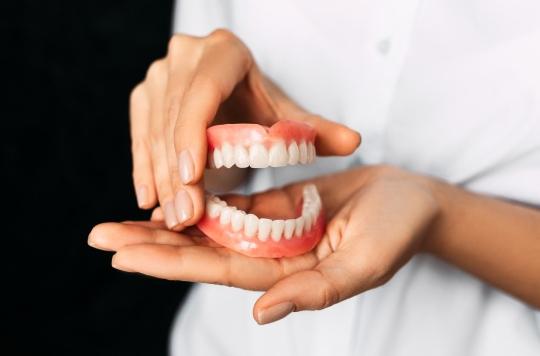Patients who use dentures show a decrease in certain nutritional biomarkers. This reduction is not observed in adults who do not use this device.

- The removable prosthesis is made of resin. The partial prosthesis has hooks unlike the total prosthesis.
- In France, the “100% Health” basket, which is accessible to all citizens who have taken out a responsible complementary health insurance contract, allows them to benefit from dental prostheses (crowns, bridges, dentures) without any additional costs.
A dental prosthesis is a device that aims to replace one or more missing teeth. It can be worn by people who have no more teeth or adults who are missing a few teeth. According to researchers at the Indiana University School of Medicine (United States), this device can have a negative impact on the diet of its user. In order to reach this conclusion, the scientists carried out a study whose the results were published in the journal Journal of Prosthodontics.
Analyze markers of malnutrition
For the purposes of the work, the authors analyzed the medical records of 10,481 patients, whose average age was 56 years. A total of 3,519 participants wore dentures between January 1, 2020 and December 31, 2018, and 6,962 volunteers did not use this device. In order to assess the nutritional profile of patients, they examined nutritional biomarkers, more specifically markers of malnutrition.
These latter “were selected from lab reports for complete blood count, complete metabolic profile, lipids, and thyroid panels”, the researchers said. They compared lab results obtained two years before the patient wore a denture and two years after.
A decrease in nutritional biomarkers
According to the results, a significant drop in certain nutritional markers was observed in denture wearers over the two years. Researchers found a decrease in serum albumin (protein), calcium, creatinine (a normal metabolic waste product), hemoglobin after wearing this device. The study showed variations in nutritional biomarkers in denture wearers, suggesting a risk of undernutrition and the possibility of using certain nutritional biomarkers to monitor the nutritional profile of patients.
“Dentals represent a significant change for a person. They do not offer the same chewing efficiency, which can change eating habits. Dentists should be aware of this and give advice or refer patients to nutrition specialists These patients need follow-up during and after the transition,” said Thankam Thyvalikakath, lead author of the works, in a statement.
















